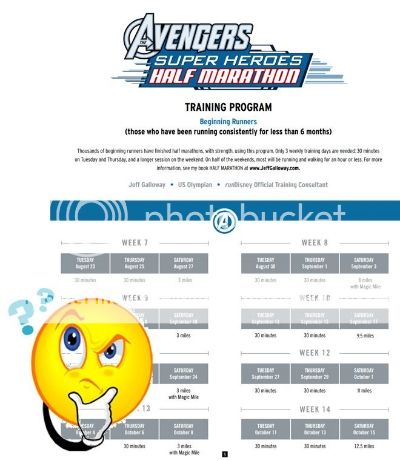lunarsongbird
Disney Magic is a Must
- Joined
- Jun 12, 2016
I'm a total newb. I love walking. And I love Disney. And I thought... "Hey! I love walking- I will just follow this Disney provided training program and walk 13 miles! Easy peasy!"

I need help. I've been diligently following my "Beginners" traning plan for my upcoming half marathon (November 13th)- "Thousands of beginning runners have finished half marathons, with strength, using this program. Only 3 weekly training days are needed: 30 minutes
on Tuesday and Thursday, and a longer session on the weekend. On half of the weekends, most will be running and walking for an hour or less. "
But after my last 9.5 miles, my back has been achy and Dr. Google mentioned that I might need to work on strengthening my core. Makes sense. Then it made me wonder- what else am I missing? If I wanted to prepare for this half marathon in the most holistic way possible- what do I need to know more about? Strength training? Stretching? Nutrition, Hydration, Fuel, "Equipment," Positive Thinking/Meditation/Visualization, Pre-Race Day Prep, Race Day Prep... And where do I find this information?
"ONLY 3 weekly training days are needed" I think not, actually.
What would YOU include in your training program?
Did you learn anything the hard way that you would like to share?

I need help. I've been diligently following my "Beginners" traning plan for my upcoming half marathon (November 13th)- "Thousands of beginning runners have finished half marathons, with strength, using this program. Only 3 weekly training days are needed: 30 minutes
on Tuesday and Thursday, and a longer session on the weekend. On half of the weekends, most will be running and walking for an hour or less. "
But after my last 9.5 miles, my back has been achy and Dr. Google mentioned that I might need to work on strengthening my core. Makes sense. Then it made me wonder- what else am I missing? If I wanted to prepare for this half marathon in the most holistic way possible- what do I need to know more about? Strength training? Stretching? Nutrition, Hydration, Fuel, "Equipment," Positive Thinking/Meditation/Visualization, Pre-Race Day Prep, Race Day Prep... And where do I find this information?
"ONLY 3 weekly training days are needed" I think not, actually.
What would YOU include in your training program?
Did you learn anything the hard way that you would like to share?

